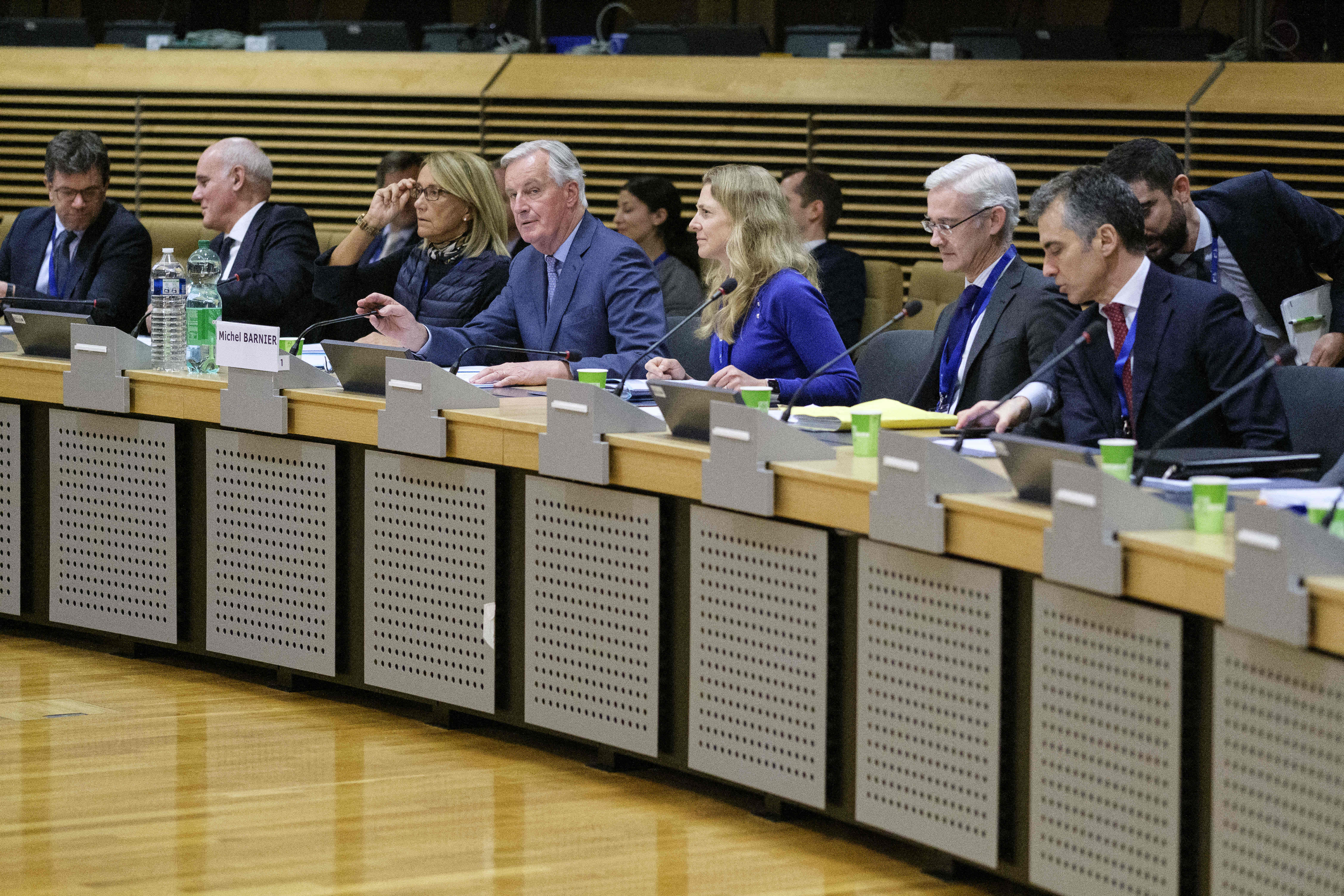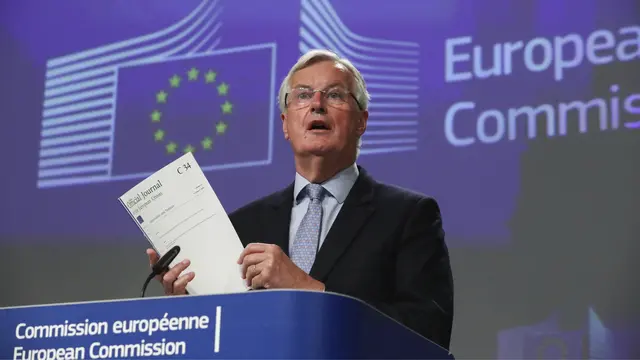
European Union's chief Brexit negotiator Michel Barnier gives a news conference after Brexit talks in Brussels, Belgium, Friday, June 5, 2020. /AP
**Editor's note: **Hamzah Rifaat Hussain is a former visiting fellow at the Stimson Center in Washington and currently serves as an assistant researcher at the Islamabad Policy Research Institute (IPRI) in Pakistan. The article reflects the author's opinions, and not necessarily the views of CGTN.
Since the pandemic, both Europe and the United Kingdom have had their fair share of misfortunes and poor policymaking. On the subject of Brexit, both sides are yet to come up with a definitive conclusion on what form a viable free trade agreement ahead of the all-important June summit should take. These concerns have been expressed by the EU's Brexit negotiator, Michael Barnier, in a news conference in Brussels this week.
So far, there has been no meaningful progress on key areas of the agreement that could validate the safe passage of a "soft" Brexit for the UK. Key areas such as fair competition guarantees, fishing rights and the exact contours of the new relationship remain unresolved. Such irreconcilable differences have persisted, and in the four months since Brexit materialized, the two sides are further apart and creating multiple policy quagmires for all concerned.
Issues beyond Brexit, such as delays over key policy decisions, have been a characteristic of the EU since the COVID-19 pandemic first broke out on its shores with clusters reported in Lombardy. From political squabbling over providing financial relief to pain-stricken Italy to a lack of consensus on the EU's recovery plans affecting the future of the bloc, the EU now risks finding itself in yet another morass. Much of this is plainly unaffordable, given that easing lockdown restrictions across the continent risks the possibility of an increase in COVID-19 cases, which demands a joint response beyond the fiscal stimulus package that has recently been agreed upon.
A smooth transition with the United Kingdom securing a maintainable trading framework with the bloc is essential for greater resources, which could then be dedicated toward COVID-19 contingency planning. Prudent, shrewd and fastidious decision-making allows both the United Kingdom and the EU to focus on policy dealing with COVID-19 specifically.
However, the current relationship between Brussels and London is being governed by a transition agreement that places importance on previous terms and conditions. Current negotiations have centered on newer and more relevant terms, such as fishing rights and fair competition between corporations, which both sides have failed to agree upon.

The European Commission's Head of Task Force for Relations with the UK Michel Barnier (4th R) attends the first bilateral meeting of formal negotiations on the future EU-UK relations, in Brussels, Belgium, March 2, 2020. /AP
While there has been a noted absence of vitriolic rhetoric between both parties, who are planning on intensifying negotiations later in June, the EU does consider the United Kingdom to be at fault for the stalled negotiations. The only progress made so far between Brussels and London has been on human rights, with cooperation on matters of adjudication, criminal procedures and the provision of justice being scheduled from 2021 onwards.
There has also been a mixed response to the Brexit quagmire from London. The EU has asserted that talks will only be considered substantial if London subscribes to what are termed as "level playing field" rules, ensuring fair regulatory standards on subjects such as labor, taxation and the environment in the process. This has been viewed as dictatorial by the United Kingdom, which has criticized the EU for what it considers as the latter's efforts to blatantly impose its policies on a sovereign state.
The question of state sovereignty is a sticking point between the two sides, as has been clarified by the German Ambassador to the EU Michael Clauss this week. Maintaining British state sovereignty as well as ensuring complete access to the EU market is undoable and rightly so, given that states falling outside the ambit of the Lisbon Treaty are to be treated with a different set of protocols and procedures.
The UK, on the other hand, is adamant in pushing the EU to soften its positions or move them in accordance with British priorities, a fact that Brussels continues to have reservations over. This visible trust deficit has festered and permeated into many rounds of talks between the two sides, with differences acting as a major flashpoint for any future agreement despite the initial optimism expressed on the minimal progress achieved on subjects such as human rights.
A total of 825 billion U.S. dollars in trade was at stake, right before the COVID-19 pandemic hit both Europe and the UK. This comes at a time when trade and resuscitating sovereign economies across the continent in the aftermath of the pandemic is critical. However, all this gets clouded due to differences that persist on nuclear cooperation as well as money laundering between the UK and the EU, which have long term strategic implications for both sides. Even a mechanism on fishing has not been agreed upon. It did not materialize last week, boding ill for any possible settlement. Thus, there is little room for optimism ahead of June, given the hard facts regarding a Brexit trade agreement which have been tabled.
If the negotiation period fails to get extended by this month, a deal would eventually have to be secured by the end of October, which would allow for sufficient time for ratification from each of the 27 EU member states. Later this month, British Prime Minister Boris Johnson is also due to hold talks with the President of the European Commission, Ursula Von Der Leyen and the chair of the 27 member states, Charles Michel. What transpires in those meetings gives reason for believing that a Brexit trade agreement that becomes a binding framework could eventually materialize for the betterment of both the EU and the UK. Yet, disagreements and other factors also suggest otherwise.
(If you want to contribute and have specific expertise, please contact us at
.)
 简体中文
简体中文

